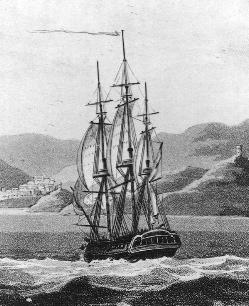Philadelphia class frigate
 |
|
| History | |
|---|---|
|
|
|
| Name: | USS Philadelphia |
| Cost: | $179,349 |
| Laid down: | November 14, 1798 |
| Launched: | November 28, 1799 |
| Commissioned: | April 5, 1800 |
| Fate: | Captured October 31, 1803, re-captured and burned by the U.S. Navy February 16, 1804 |
| General characteristics | |
| Class and type: | Philadelphia-class frigate |
| Tonnage: | 1240 |
| Length: | 157 ft (48 m) between perpendiculars |
| Beam: | 39 ft (12 m) |
| Depth: | 13 ft 6 in (4.11 m) |
| Complement: | 307 officers and crew |
| Armament: |
|
USS Philadelphia, a 1240-ton, 36-gun sailing frigate, was the second vessel of the United States Navy to be named for the city of Philadelphia. Originally named City of Philadelphia, she was built in 1798–1799 for the United States government by the citizens of that city. Funding for her construction was the result of a funding drive which raised $100,000 in one week, in June 1798. She was designed by Josiah Fox and built by Samuel Humphreys, Nathaniel Hutton and John Delavue. Her carved work was done by William Rush of Philadelphia. She was laid down about November 14, 1798, launched on November 28, 1799, and commissioned on April 5, 1800, with Captain Stephen Decatur, Sr. in command. She is perhaps best remembered for her burning after being captured in Tripoli.
Putting to sea for duty in the West Indies to serve in the Quasi-War with France, she arrived on the Guadeloupe Station in May 1800 and relieved the frigate Constellation. During this cruise she captured five French armed vessels and recaptured six merchant ships that had fallen into French hands.
Returning home in March 1801, she was ordered to prepare for a year's cruise in the Mediterranean in a squadron commanded by Commodore Richard Dale. At his own request, Decatur was relieved of the command of President by Captain Samuel Barron. The squadron arrived at Gibraltar on July 1, with Commodore Dale in the frigate President. Philadelphia was directed to cruise the Straits and blockade the coast of Tripoli, the Pasha Yusuf Karamanli having threatened to wage war on the United States.
...
Wikipedia
